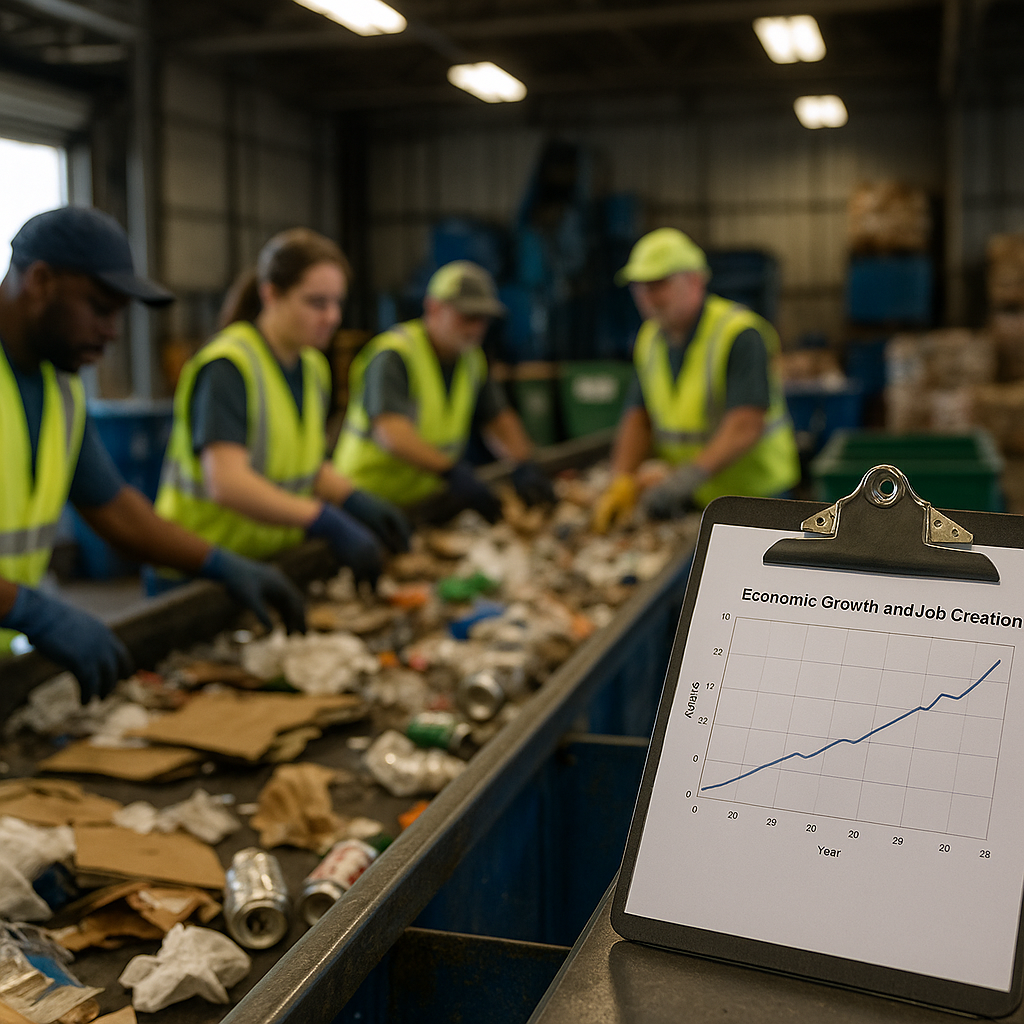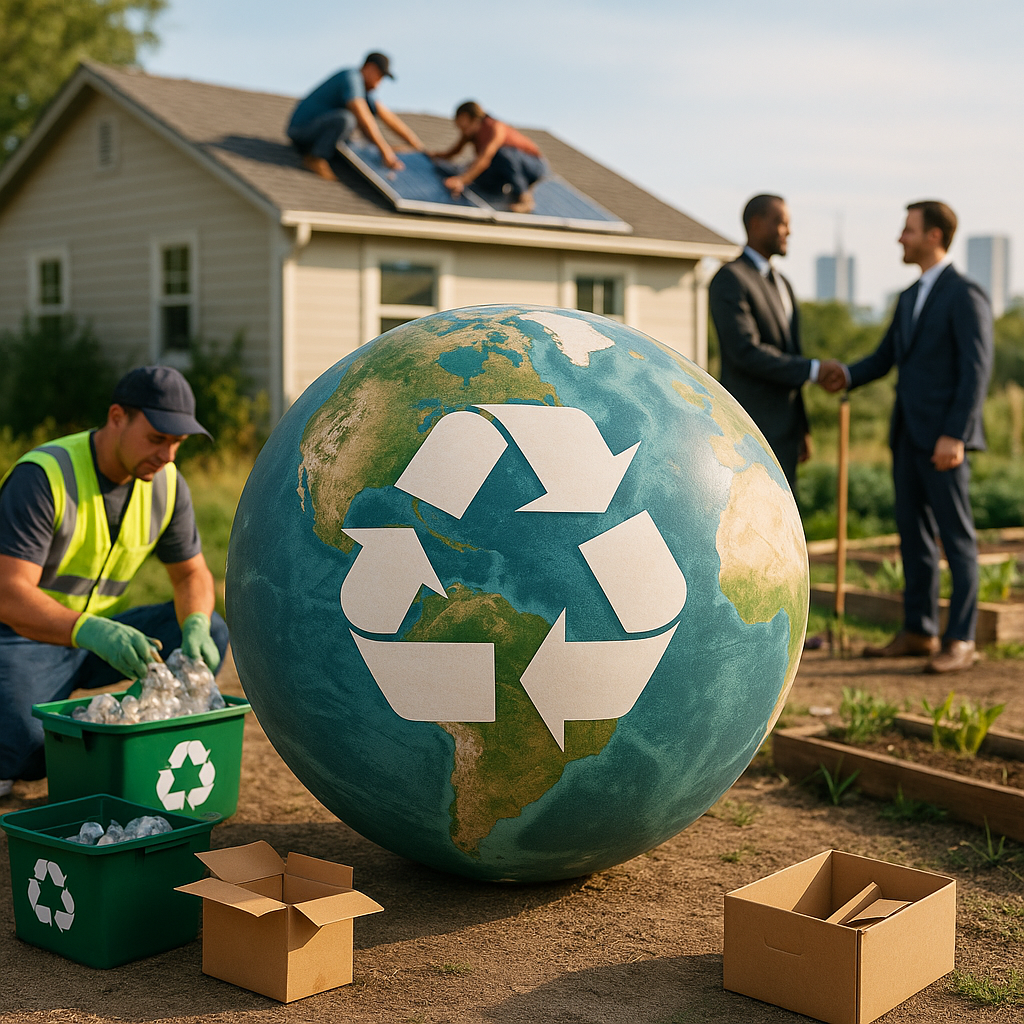5901 Botham Jean Blvd, Dallas, TX 75215
What Are the Environmental Benefits of Recycling?
May 13, 2025Over 193 million metric tons of carbon dioxide equivalent were prevented in 2018 through recycling and composting efforts in the United States, according to greenhouse gas emissions data from the EPA. This significant figure highlights one of the many environmental benefits recycling offers our planet.
Recycling is a powerful tool in combating environmental degradation. By reprocessing materials instead of discarding them, we extend the life of resources that would otherwise end up in landfills. This approach is a key element of sustainable waste management strategies globally.
The environmental benefits of recycling go beyond reducing landfill waste. From conserving natural resources to reducing energy use and addressing climate change, recycling offers multiple advantages that help protect our planet for future generations.
How does recycling contribute to resource conservation?
Recycling is key to conserving resources by significantly reducing the need for new raw materials. By recycling materials like paper, glass, metal, and plastics, we lessen the demand for virgin resources that would otherwise be extracted.
The impact on forest preservation is significant. Paper recycling reduces timber harvesting, helping protect woodland ecosystems from deforestation. Each ton of recycled paper saves about 17 trees, preserving vital habitats and carbon sinks.
Water resources benefit greatly from recycling. Manufacturing with recycled materials typically requires much less water than using raw materials. For instance, using scrap steel instead of virgin ore in steel production uses 40% less water and generates 97% less mining waste.
Metal recycling, especially aluminum, is highly effective, using only about 5% of the energy needed to produce virgin aluminum from bauxite ore. This significant energy reduction means fewer minerals are extracted.
By diverting materials from landfills and reintroducing them into manufacturing, recycling supports a circular economy rather than the traditional linear “take-make-dispose” model. This extends the lifespan of processed materials, maximizing the utility of resources already invested.
Extracting raw materials often disrupts ecosystems through mining and logging, causing habitat destruction, soil erosion, and water contamination. Recycling reduces the demand for these resource-intensive industries.
For manufacturers and businesses, recycling offers benefits beyond environmental stewardship. Reduced energy needs translate to cost savings and lower carbon footprints, creating economic incentives that align with environmental goals.
What impact does recycling have on energy consumption?
Recycling significantly reduces energy consumption in manufacturing. When materials are recycled, they bypass the energy-intensive steps of extracting and processing virgin resources. This energy conservation spans the entire production cycle, from resource extraction to processing raw materials.
The energy savings vary by material but are substantial across commonly recycled items. Recycled steel saves 60% of the energy needed for production from raw ore. Paper recycling is similarly efficient, with recycled newspaper requiring 40% less energy than manufacturing from virgin pulp.
Plastic recycling offers notable energy benefits. Manufacturing from recycled plastics consumes 70% less energy than using new materials, conserving valuable petroleum resources and reducing greenhouse gas emissions.
Glass recycling also contributes significantly to energy conservation. Producing recycled glass uses about 40% less energy than manufacturing from raw materials, as cullet—crushed recycled glass—melts at lower temperatures.
Energy savings are especially remarkable for aluminum recycling. Recycling aluminum requires 95% less energy than extracting and processing it from bauxite ore, making it the champion of energy-efficient recycling. A single recycled aluminum can saves enough energy to power a television for three hours.
These substantial energy reductions translate to lower carbon emissions and decreased fossil fuel consumption. By integrating recycled materials into manufacturing supply chains, industries can significantly reduce their energy footprint while maintaining product quality.
Using recycled materials also reduces the need for energy-intensive mining and resource extraction, which typically consume substantial energy and cause environmental disruption. Recycling alleviates these impacts by keeping valuable materials in circulation.
| Material Type | Energy Savings (%) |
|---|---|
| PET | 79 |
| HDPE | 88 |
| PP | 8 |
| Steel | 60-74 |
| Aluminum | 95 |
| Paper | 40 |
| Glass | 40 |
For communities and businesses, these energy savings represent both environmental and economic benefits. Lower energy requirements in manufacturing typically translate to reduced production costs and smaller carbon footprints, making recycling both environmentally sound and economically advantageous.
How does recycling benefit the economy?

Recycling creates significant economic opportunities through job creation and revenue generation. The recycling industry employs over 1.1 million workers across the United States, according to the National Recycling Coalition. These jobs span collection, sorting, processing, and manufacturing sectors, offering diverse employment options at various skill levels.
The financial impact is equally impressive. The industry generates approximately $236 billion in gross annual sales and contributes $37 billion in annual payroll to the national economy. This economic activity stimulates growth and provides stable employment opportunities nationwide.
Recycling significantly outperforms traditional waste disposal methods in job creation. Processing 10,000 tons of waste through recycling creates 36 jobs, while incineration of the same amount generates just one position. This 36-to-1 ratio highlights recycling’s superior capacity for employment generation compared to conventional disposal approaches.
State-level initiatives showcase these economic benefits in action. California’s recycling programs have been particularly successful, creating numerous green jobs while diverting materials from landfills. Massachusetts has likewise seen substantial economic gains through its commitment to recycling infrastructure and programs.
Beyond direct employment, recycling reduces costs for businesses and municipalities by decreasing waste management expenses. Using recycled materials often requires less energy than processing virgin resources, leading to significant operational savings for manufacturers. These cost advantages make recycled materials increasingly competitive in various production processes.
The economic benefits extend into the circular economy framework, where materials maintain their value through reuse and recycling. This approach creates new markets for recycled goods, spurring innovation and entrepreneurial opportunities. The development of advanced sorting technologies and processing methods continues to expand what materials can be effectively recycled.
Conclusion: The multifaceted impact of recycling on our planet

Recycling is a cornerstone of environmental sustainability with significant benefits. It conserves natural resources by reducing the need for virgin materials and lessens environmental disruption from mining and resource extraction. Recycling also reduces landfill waste, decreasing methane emissions and soil contamination while saving energy compared to manufacturing from raw materials. Beyond these environmental advantages, recycling generates economic opportunities by creating jobs in collection, sorting, and processing sectors.
Whether you’re a municipality seeking sustainable waste solutions or a business looking to enhance environmental compliance, contact Okon Recycling at 214-717-4083. Our expertise in waste management and material recovery can help you implement effective recycling strategies that benefit both the environment and your bottom line.
